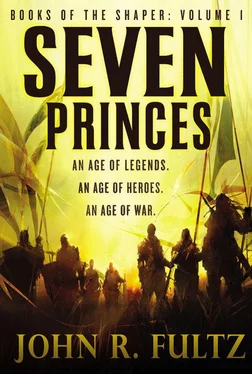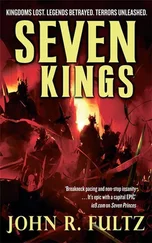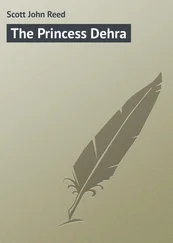John Fultz - Seven Princes
Здесь есть возможность читать онлайн «John Fultz - Seven Princes» весь текст электронной книги совершенно бесплатно (целиком полную версию без сокращений). В некоторых случаях можно слушать аудио, скачать через торрент в формате fb2 и присутствует краткое содержание. Жанр: Фэнтези, на английском языке. Описание произведения, (предисловие) а так же отзывы посетителей доступны на портале библиотеки ЛибКат.
- Название:Seven Princes
- Автор:
- Жанр:
- Год:неизвестен
- ISBN:нет данных
- Рейтинг книги:5 / 5. Голосов: 1
-
Избранное:Добавить в избранное
- Отзывы:
-
Ваша оценка:
- 100
- 1
- 2
- 3
- 4
- 5
Seven Princes: краткое содержание, описание и аннотация
Предлагаем к чтению аннотацию, описание, краткое содержание или предисловие (зависит от того, что написал сам автор книги «Seven Princes»). Если вы не нашли необходимую информацию о книге — напишите в комментариях, мы постараемся отыскать её.
Seven Princes — читать онлайн бесплатно полную книгу (весь текст) целиком
Ниже представлен текст книги, разбитый по страницам. Система сохранения места последней прочитанной страницы, позволяет с удобством читать онлайн бесплатно книгу «Seven Princes», без необходимости каждый раз заново искать на чём Вы остановились. Поставьте закладку, и сможете в любой момент перейти на страницу, на которой закончили чтение.
Интервал:
Закладка:
Iardu turned away, his white fires dying.
It was too late.
He fell into the cosmic orifice, shrinking as it pulled him deeper. Where Elhathym had been was now a swirling shard of the ultimate void. Iardu was a tiny speck lost in the depths of nothingness. Now rocks, trees and debris went flying into the void-mouth. It closed slowly, deliberately, until it was again the mouth of a yawning titan. Then that titan was a Giant, then the Giant was a solitary man wrapped in black silk and blood-colored jewels. He stood in triumph amid a wasteland that had once been called Zaashari.
Sharadza had crawled through the grass between mounds of rubble as he diminished. Her soundless tears spilled onto the ground like the trail a slug leaves behind as it glides.
Elhathym stood quietly in the smoking desolation. The waters of the sea had invaded the ruined cornfields, and the structures of man were obliterated. The coastline had been altered by the powers unleashed here. Perhaps he reflected on the loss of his five thousand Yaskathans or his legions of Vakai. For whatever reason, he stood silent as a statue, his silver mane waving in the wind.
Behind him Sharadza rose from a pile of pulped masonry, and she hurled the sun-spear with all her might.
It sped toward his back, and time seemed to slow. Dust-motes danced in the air… Brown leaves blew between her and the sorcerer, stirred by the wind of her cast.
The bright spear struck Elhathym between the shoulders and passed half its length through his body. He stood transfixed by the bolt of sunfire, his robe smoking and burning, but he did not bleed.
He turned to face her, the golden spear-blade pointing from his breastbone like an accusing finger, flaming with sorcery. His eyes met hers across the brief expanse of ruined ground, and they were lightless things… as empty as the void he had become.
She held her breath. Her knees trembled.
His head fell back once again, and he laughed. The crown sparkled on his brow as he wrapped a hand about the spear and yanked it from his breast. He snapped it in two and it melted into rays of sunlight that faded on the wind.
He smiled at her, and she stared at the hole burned completely through his chest. As she watched, powerless to move, unable to fall or scream or even speak, shadows bled forth to fill that gaping wound.
He has no physical body.
This is only a garment he wears to disguise his true substance.
He is not a man at all.
Elhathym reached a claw toward her, and a second claw, much larger and made of darkness, wrapped itself about her body. She reacted inst inctively in the only way she could. Her flesh took on the gray pitted substance of the rocks under her feet. She became a statue of solid stone, frozen in his awful grip, but rigid and unfeeling. She could not have borne his chill touch on her soft flesh. It would have killed her.
He drew her close to study her granite features, admiring a skillful piece of sculpture.
“Princess,” he said, and even with ears of stone she heard him.
Inside the stone her consciousness lived and was fully aware.
Trapped.
“You have taken a form that is pleasing to me,” he whispered. “What a fine ornament you will make for my throne room.”
The dark claw shrank, and the Sharadza-statue shrank with it. She was fully in his power now. She could no more regain her fleshly substance than she could speak or run. Now she dwindled to a tiny figurine, a mere trinket in the palm of Elhathym’s hand.
“Perhaps in a while I’ll restore your tender and lovely flesh,” he said, “and you will please me in other ways.”
He tucked her into a pocket of his black robe. After that she knew only darkness.
Despite e="e="3"›He all her efforts, war had come and swept over her, a tide she did not even see until it completely drowned her. Like the ocean that drank the torn fields of Zaashari, it would spill across the land and devour every living thing.
She wanted to weep for Iardu, for Khama, both of whom had died because of her.
But a stone figurine could not weep any more than the statue of a Giantess could.
Gods of Earth and Sky, forgive me.
28
The legions of Mumbaza moved across the plains of northern Yaskatha, a sea of white silk, bronze blades, and ebony faces. In their fists gleamed ten thousand spears, and tall plumes waved atop their masked helms. The vanguard was three legions of horsemen, their stallions caparisoned with silver and gold. At their center rode a blended cohort of warriors from Uurz, Shar Dni, and Udurum, northern banners flapping beside the flag of the Feathered Serpent. D’zan, Tyro, and Lyrilan rode in the front ranks, alongside a coal-black charger that carried the High General Tsoti. A blade of Udurum steel hung at the general’s side, a golden spear in his hand.
Behind the cavalry came five thousand spearmen on foot, wrapped in ivory cloaks and corselets of boiled leather. Each man bore a curved bronze blade and dagger, but they were devotees of the spear. Their shields were pointed vertical ovals made from wood, hide, and bone reinforced with ribs of bronze. In lieu of metal helms the footmen wore headdresses of war, towering displays of plumage on frameworks of bone and wire. From afar they seemed a vast flock of predatory birds.
Two thousand archers marched behind the spearmen, their great bows of horn and cedar hung with the pale feathers of seabirds. Quivers stuffed with barbed arrows hung on their backs and bronze blades at their belts. They were Fangs of the Sky God, elite bowmen whose skills were legend across the continent.
A train of wagons bearing servants, supplies, fletchers, armorers, and weaponsmiths rolled after the archers, pulled by two hundred oxen and three hundred dromedaries. The rearguard was another legion of mounted cavalry to protect the precious caravan.
Priests of Sky, Sun, Earth, and Sea walked among the ranks, blessing warriors and speaking ancient parables. The six Adjutant Generals rode at strategic points among the legions, each reporting twice a day to Lord Tsoti. Since passing through the remains of Zaashari, the Mumbazans had craved priestly comfort more than ever.
In three days this massive force had been assembled under Lord Tsoti’s supervision. The Boy-King must remain in the city, so Tsoti was his eyes, ears, and hands in the field. D’zan learned quickly that the man was a hero to his people, a figure of nearly divine esteem. Tsoti stood taller than any man D’zan had seen, excepting the Giants of the northlands. His muscles seemed hewn from onyx, and the gray at his temples was the only sign of his age. Although Mumbaza had avoided war for a century, Tsoti had earned fame as a mercenary fighting in Trimesqua’s armies during the Island Wars. They said e="e=izehe slew a flesh-eating monster on some deserted island where his ship had been wrecked, saving hundreds of lives. D’zan met him in the Boy-King’s throne room, where he reported the readiness of his legions. He looked upon D’zan, the son of his old comrade, with fatherly eyes.
“Prince.” He greeted D’zan with a bow and a voice smooth as molten iron. “I knew you only as a babe in your mother’s arms. Now you are a man… and soon you will be a King.” He embraced D’zan, and the Prince could only smile and thank him. Tsoti asked for word of Olthacus the Stone. His wide grin turned to a frown when D’zan gave him the news. That day had begun the trek southward, and D’zan was proud to ride in his company.
Four days later the vanguard discovered the mass of debris and wasted ground where proud Zaashari had recently thrived. There was nothing left of it but piles of crumbled stones. Tsoti pointed to where the hill-fortress had stood. The ground there now was flat and littered with black dust.
Читать дальшеИнтервал:
Закладка:
Похожие книги на «Seven Princes»
Представляем Вашему вниманию похожие книги на «Seven Princes» списком для выбора. Мы отобрали схожую по названию и смыслу литературу в надежде предоставить читателям больше вариантов отыскать новые, интересные, ещё непрочитанные произведения.
Обсуждение, отзывы о книге «Seven Princes» и просто собственные мнения читателей. Оставьте ваши комментарии, напишите, что Вы думаете о произведении, его смысле или главных героях. Укажите что конкретно понравилось, а что нет, и почему Вы так считаете.












